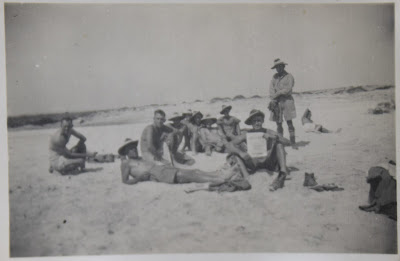.JPG) |
| Komiža, Vis - port of the Partisan and Allied navies |
September 1943 – Fascist Italy capitulates to the Allies. Nazi Germany invades the Dalmatian coast and its Adriatic islands. Only Vis remains unoccupied.
January 1944 - Tito declares that Vis must be defended.
Island of Terrible Friends by Bill Strutton is the sixth eyewitness account I have read about World War 2 in Yugoslavia. The previous five
were Embattled Mountain by Bill Deakin, Eastern Approaches and The Heretic by
Fitzroy Maclean, Irregular Adventure by Christie Lawrence, and Partisan Picture
by Basil Davidson. We have these British soldiers to thank for grit, honesty
and a rough admiration of ruthlessness, and those contemporary politicians in
Belgrade and Zagreb who rewrite their history in order to honour themselves
would do well to read them.
War is a terrible thing and although one may commence a book of this sort
believing that the British were British and the Yugoslavs were Yugoslav, and
never the twain shall meet, yet these British authors give praise where it’s
due. ‘But if the Commandoes imagined they were fighting a tough war, the
[Yugoslavs] were fighting a far more desperate one, right by their side.’
Island of Terrible Friends is written like a novel and records the mission of
Major James Rickett from the Royal Army Medical Corps to set up a field
hospital in January 1944 on the Adriatic island of Vis for the 50 Commandos
there at the time. Also present were 1000 Partisans and a steady stream of
wounded civilians escaping from the German occupied coast.
The commando’s task was to harass the Germans.
Commando Lieutenant Barton ‘dressed as a peasant and with two Partisans to show
him the way, loaded his Sten gun on a mule under a burden of firewood and
walked passed a number of German sentries right into the village of Nerežiše on
the island of Brać, garrisoned with 200 Germans. One of the Partisans stood guard
outside while he knocked on the Commandant’s billet, was admitted, thrust past
a screeching woman to a bedroom upstairs, and there, in the faint light of a
candle, fired a burst at the German Commandant who, half risen and gaping
wordlessly, leaned over and fell. Barton calmly helped himself to the dead
commandant’s automatic, his compass, an excellent pair of binoculars and a
rifle. [Then] he beat it with his two Jugoslav comrades through a thicket of
sentries.’
With scant medical stores and a general reply of ‘No’ when he requested any more,
Rickett begins treating injuries with a lack of everything except desperation,
removing a ruptured spleen, for instance, by a Tilley lamp fuelled by rakija
until he was able to ransack a Liberator that crashed on the island, for wire
and switches to light his hospital.
‘The sea around [Vis] was busier after dark than Piccadilly in the blackout’
and the Germans were always at their door. Each morning Messerschmitts circled,
attacking the settlements of Vis, and the Partisan Navy of tuna boats and
trawlers camouflaged themselves in the steep bays, caves and inlets until
setting out on their missions to sabotage the Germans bases on islands so close
that they could be easily seen with the naked eye.
The British opinion of working with the Partisans varied between admiration and
outrage. ‘Twenty-eight German divisions [were] drawn and pinned down in the
Balkans by Partisan ebullience.’ Yet, their discipline and ruthlessness that
sometimes shocked the British reflect the harshness of pre-war peasant life
recorded in such works as Irregular Adventure by Christie Lawrence and Rural
Women in Croatia-Slavonia in 1900 by Elinor Murray Despalatovic.
That these famers, labourers and housewives could so irritate the Germans to
the extent of gaining their respect as an army, Strutton doesn’t seem to have
appreciated as well as Basil Davidson or Bill Deakin, or even Fitzroy Maclean
who was from the Scottish aristocracy. Strutton writes to entertain an English
audience, and his descriptions of the Partisans lack the intimacy of the other
writers. They are devoid of the solemn Partisan purpose and discipline that
drove the resistance movement and was like a holy thing to them. It might be a
language problem, as I noticed he made mistakes when transcribing what the
partisans say in such simple things as numbers.
One can easily see from the photos of the Partisan Navy in the Adriatic Naval
War (Freivogel/Rastelli, Despot Infinitus 2015) with what pride the sailors
respond to Tito’s inspection of their fleet. ‘Continuously at sea in spite of
adverse weather and taking every risk in the face of German and Italian revenge.’
Yet Strutton often describes the Partisan Navy like a ramshackle afterthought
without an understanding of the lives of its members.
One scene, however, I cannot forget. A stricken Allied bomber crosses the
island, blazing from nose to tail, and crashes into the sea. One young man
alone parachutes out. Upon landing safely, he collapses in tears of shock all
over an elderly peasant woman who has no idea who he is and can’t speak his
language. She soothes and strokes him, calling him ‘my son’, until transport
arrives to take him to hospital. It reminded me of the words of Jesus: wherever
the Gospel goes in all the world, this story will be told in memory of her.
.jpg)


.jpg)





